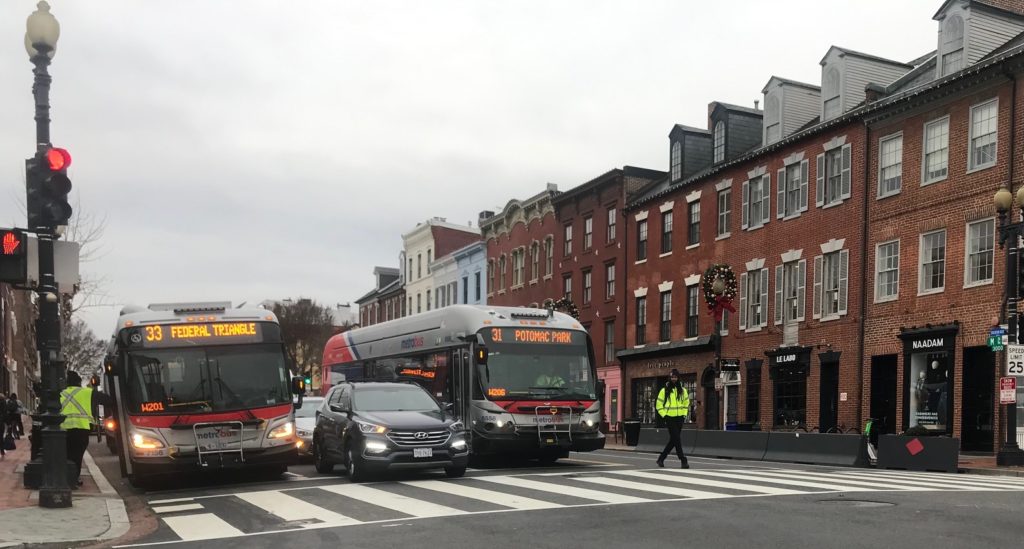D.C. Metro Bus Rides to Be Free by July 1
By • December 12, 2022 One Comment 3227

This month, the D.C. Council did something that no other governing body a city Washington, D.C.’s size or larger has ever done: it unanimously agreed to offer and fund free Metro bus services across the city — that is, no charge to any D.C. residents and visitors by summer 2023. The free trips are only for those starting in the District — even if the trip ends in Maryland or Virginia. Trips originating outside D.C. will still require a fare, and the Circulator bus system run by the District Department of Transportation will continue to charge one dollar. When celebrating the decision, D.C. leaders remarked that they hoped lawmakers in Maryland and Virginia would follow suit.
Ward 6 Council member Charles Allen said the bill hopes to make bus services faster, increase bus ridership, reduce road congestion, eliminate fare evasion and be more reliable without people having to stop and pay a fare. “Great idea when trying to tackle social inequity and improve air quality,” he commented. Advocates claim that goals put forth by such programs are admirable, encouraging more public transit use and eliminating barriers for lower-income riders.
The price tag for taxpayers for the next fiscal year’s free Metro bus program is estimated to be $43 million, according to District Council Chairman Phil Mendelson. That cost will increase by 5 percent every year after.
The decision was not without controversy — at least outside the council voting chambers. The obvious issue is that providing public transportation that is safe and effective is expensive. The seemingly obvious benefit of giving up fares is that significant money is saved by not having to have a large staff of fare collectors and enforcers. “But the actual cost of removing the fare boxes will leave the system with a very large revenue shortfall,” according to a study by Jennifer Perone and Joel Volinsk at the University of South Florida.
Similarly, the theoretical goal of making public transit free in order to encourage people to use cleaner emissions alternatives, such as electric busses and light rail rather than their cars has also turned out not to happen. Studies have shown that after the fare box was dropped, car trips dropped by just 3 percent. Transit rides did jump to 63 percent of all trips, but much of that was due to a “staggering decrease” — 40 percent — in the number of walking trips that shifted to the free buses — where ridership increased significantly. The effects on car traffic was “marginal,” concluded a 2020 policy brief on free public transit by the International Association of Public Transport. “The lack of a large environmental benefit is generally well accepted at this point.”
Georgetown residents have told The Georgetowner “off the record” that their biggest concern of riding or having their children ride the free bus service is the probability of a substantial increase in the number of possibly mentally ill homeless people who will ride on, sleep in and more or less stay on the busses all day.
This often unspoken objection to free fare is acknowledged by Dorothy Moses Schulz, a professor emerita at John Jay College of Criminal Justice in New York, who was quoted in a 2021 Stateline article as saying that free-fare systems were a “terrible idea” and would likely result in an increased presence of homeless people and more disorderly or criminal activity. She was more in favor of reduced fares for low-income riders.
Meanwhile, Mayor Muriel Bowser supports the concept but is concerned about its cost and wrote to Council members: “District residents and taxpayers will have to pay for this program. Our neighbors, Virginia and Maryland, should absorb some of these costs as their residents will benefit from this program as well.”
The impact in D.C. may show the way in the new post-pandemic era. It is another effort in the struggle of many cities, including Washington, to come out of a post-pandemic ridership slump. After two years of remote working, many office workers do not want to fight traffic and parking and possible accidents by coming to work in their cars.
The second and final Council vote on the proposal will be on Dec. 20.


Great Job ! D.C. Councilman Staff / Mayor of DC
I Love the District of Columbia. An excellent change to the city. Thanks❤️